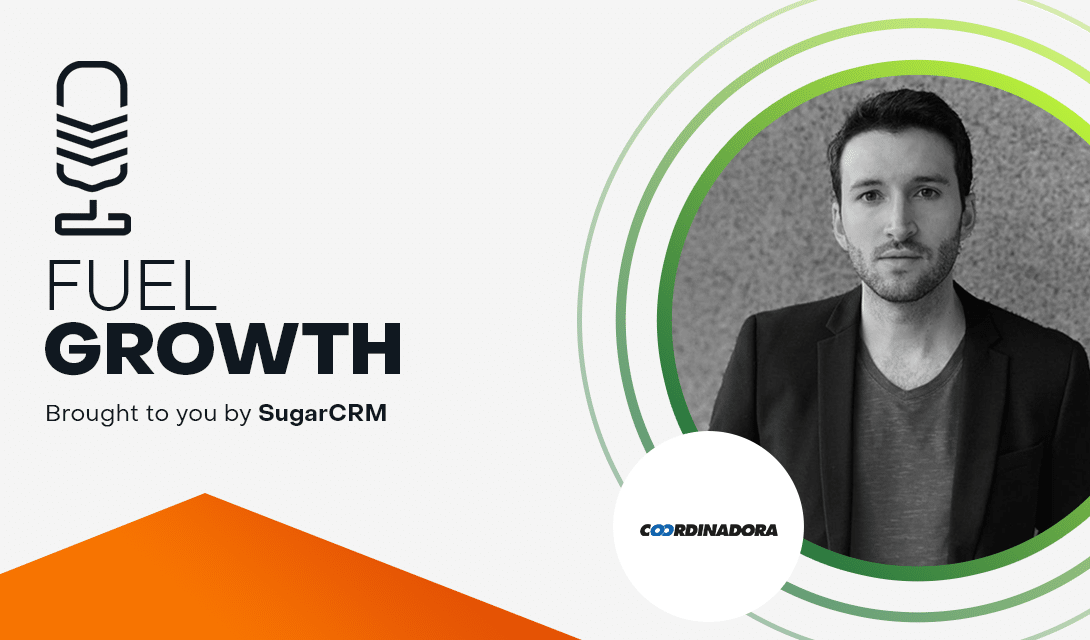Fuel Growth Podcast: Delivering Sales and CRM Success
On this episode of the Fuel Growth podcast series, my co-host Lizzy and I got to sit down with Andres Obando, Vice President of Sales at Coordinadora Mercantil, the largest locally-owned logistics and delivery company in Colombia.
Started by his grandfather in 1967, Andres and his family have been generationally committed to providing excellence in the shipping industry by tackling the lack of delivery logistics and reliable transportation methods in Columbia.
In this episode, Andres shares his in-depth operational knowledge, along with a wealth of experience in the shipping industry, from sales strategies to the standard of service he and his family implement for their organization. We were extra excited to speak with Andres this week to understand more about how a sales- and service-centric approach to growth is paramount to the logistical side of sales operations for organizations looking to create a well-oiled go-to-market (GTM) machine.
The Winning Framework to Building a Sales Team and Hitting Your Targets
1. Having the Right CRM
A robust CRM platform serves as the central hub for managing and analyzing customer interactions, providing valuable insights that empower organizations to understand their customers better. Andres stated, “A couple of years ago, when we implemented SugarCRM, it really helped us to prioritize organizing the different leads and potential clients that were coming in because, before Sugar, everything was completely disorganized. We worked in Excel and with all the different cities we delivered to and all the hubs we had, it created a mess for a personal service company. On top of that, all of our sales teams are…located in…different cities, which made it difficult to organize without a CRM, where we can actually see all the customer data they’re putting into the system.”
2. Customer Service is the End-All, Be-All for Businesses
Viewing customer service as the end-all, be-all for a business is a strategic mindset that recognizes the pivotal role customer satisfaction plays in overall success. Andres went on to say, “Service to us is the most important part of our company. Being a logistics service company focused on [competing with] big brands, we know off the bat they are not looking for branding, they’re looking for an actual service partner who won’t create more problems for them at the end of the day. Service is the most important thing that we’re looking at because we don’t want our customers to experience any issues [at] the moment that we deliver.”
3. Linking Your BI Tool and CRM
Business Intelligence (BI) tools collect, analyze, and transform raw data into meaningful insights. This empowers businesses to make informed decisions based on accurate information rather than relying on intuition, which is invaluable for tailoring products, services, and marketing strategies to meet customer expectations. Andres stated, “We also have a big Business Intelligence (BI) department. I think a big thing for our sales team is to stay motivated and to be constantly looking at their day-to-day sales in a live way. That way they can check exactly how many units we’ve been taking up every day and how they’re personally doing compared to the month before. Before we had our CRM and BI tools, we were pretty blind…We’re doubling our sales from last year for new clients, and I think that that’s because of our service and how much growth our brand has seen”.
4. Ground Your Expectations in Reality at First When Rolling out a New CRM
While a CRM holds the potential to revolutionize customer interactions and streamline processes, it is essential to recognize that the implementation phase may bring its own challenges and adjustments. Andres echoed this when he said, “I think that in the discovery stage, you learn a lot and you dream a lot, and everything on paper looks pretty easy. But at the end of the day, SugarCRM or any other software that you implement in a company, there will be a couple of things that you will have to depend on the developers for.” This is a significant consideration for any company and strategic planning. You must be selective and realistic in what you commit to—you can’t say yes to everything. Many times, it all depends on your IT team and how fast they can work and bring your vision to life.
Andres went on to say, “I think that that happens a bit in the CRM implementation process, we start to dream with so many things. But at the end of the day, the best thing that we actually did was to roll back and say, okay, let’s start with a minimum viable product and then start growing from there”.
5. Prioritize Transparency with Your Teams
As your business grows and evolves, so should your employees. Andres believes that showing employees opportunities for growth and professional development can help them accept changes in the company strategy. He stated, “It’s important for you to show your team through sales and through growth that there are opportunities for them. Over time, there will be different changes that you will implement to help you reach your targets. And many times it will work, and it will work out for them. But there will be a couple of times where they will be affected by whatever change you perform, so it’s important to show them also that there will be different projects and opportunities for them to grow as a professional with your company that may require them to outgrow their current role”.
Top Two Mistakes Andres Has Made is His Career as a Sales Leader
1. Don’t Be Afraid to Say ‘No’
Andres recounted, “ I think once you grow and start investing a lot in marketing and what your brand is known for, there are so many new opportunities that come to the table. One of the most important things to learn is how to say ‘no’. When there are more opportunities at the table, even if they’re great ideas, if they’re not coherent with your strategy, you have to be able to say no and keep focused on your strategy. Ideas that fit in your strategy and your network, then you can probably say yes, but feel okay to say no too. I would probably say that one of my biggest failures, not saying no enough.”
2. Be Okay With Admitting If a Change Isn’t Working
Andres stated, “I think the most important thing to have in mind is that there’s always time to turn back—especially when it comes to your strategy. For example, maybe a couple of months ago you gathered the team and told them that from now on, we’re doing things this way or that we’re heading toward this market in this direction. It doesn’t mean that two months later, you can’t come back, rewind, and say to everybody that we had a misstep and that we’re going to change a couple of things and readjust. I think that’s one of the important things, to not to be afraid to actually accept your faults and to tell the team that we are constantly going to be readjusting—No strategy will ever completely be 100%.”
Taking Sales to the Next Level with the Power of Sales Logistics
As we concluded this episode, Andres Obando emphasized the transformative potential of embracing a culture steeped in innovation, adaptability, and sales-centric strategies. This crucial approach enables organizations to unlock unprecedented growth and innovation, propelling them to new heights of success with the help of next-level sales analytic tools.
For a deeper dive into the impact sales logistics has on business transformation, relationship-building, and sales enhancement, tune in to the complete podcast conversation available here. If you want to catch up on our previous episodes, you can do so here or on your favorite podcast app.



